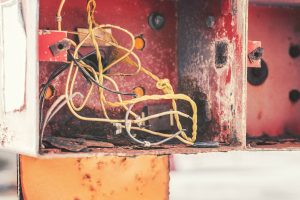Unfortunately, electrical wiring mistakes are all too common. These mistakes are easy to overlook and can be very dangerous and even deadly. We’ve listed the most common electrical mistakes and how to avoid them.
Making connections outside electrical boxes
 Connecting wires outside an electrical box, sometimes called a junction or J box, is a serious issue. These boxes are made to protect the connections from heat or sparks from a loose connection, accidental damage, or short circuit. It is important to install an electrical box where wire connections aren’t contained.
Connecting wires outside an electrical box, sometimes called a junction or J box, is a serious issue. These boxes are made to protect the connections from heat or sparks from a loose connection, accidental damage, or short circuit. It is important to install an electrical box where wire connections aren’t contained.
Cutting wires too short
Wires should protrude from the box at least 3 inches. Cutting them any shorter can lead to poor connections, which can be very dangerous. One solution is to apply six inch extension onto the wires.
Leaving the plastic sheathing cable unprotected
We all know wires should not be left exposed. Wires that are behind the scenes, boarded up in the framing of a building, are often forgotten. Electrical code requires these wires to be protected by a plastic sheathing. When these plastic sheathing wires are not properly secured, they are left vulnerable – yet causing another fire hazard.
Loose outlets and switches
When outlets and switch become loose, not only do they look bad, they are a potential fire hazard. Outlets that are loosely connected can move around, making the wires to loosen from the terminal. These wires have the potential of overheating and arcing. These connections need to be tightened or replaced.
Installing a three slot receptacle without a ground wire
Most of our new technology and appliances require a three slot receptacle. You may think easy enough, just change it out, but this can cause a dangerous situation if there isn’t a ground wire. A tester can be used to ensure the outlet is grounded.
Reversing hot and neutral wires
Wires can be tricky and easy to mixed up. Connecting the neutral wire to the hot wire can create a lethal shock. The mistake may not even be realized at first because devices and lights may still work, just not safely.Here certified technicians provide affordable and professional electrical repairs.
It is these mistakes is why the Environmental Healthy & Safety, University of Washington, Basic Electrical Safety, has issued guidelines of what to avoid when working with electricity.
Avoid activities that require training
Working with exposed conductors carrying 50 volts or more
Making repairs or alterations to any electrical equipment
Opening up the case, or removing barrier guards, of any equipment that utilizes electricity
Using any tools or a meter to measure for the presence of electricity
Reseting a tripped circuit breaker, or replace a blown fuse
Ask a qualified person to perform these tasks
Have An Electrical Problem?
If you have any type of electrical issue within your home or business, Sanford Electric Company is here to help. Locally owned and operated, we guarantee customer satisfaction.
For the safety of your family and employees, it is important your electrical system is working safely and efficiently. Ignoring issues, especially those caused by older wiring, can pose a fire threat.
